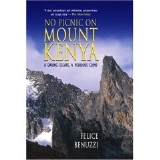
No Picnic on Mount Kenya
Encyclopedia

Italy
Italy , officially the Italian Republic languages]] under the European Charter for Regional or Minority Languages. In each of these, Italy's official name is as follows:;;;;;;;;), is a unitary parliamentary republic in South-Central Europe. To the north it borders France, Switzerland, Austria and...
prisoners of war to reach the summit of Mount Kenya
Mount Kenya
Mount Kenya is the highest mountain in Kenya and the second-highest in Africa, after Kilimanjaro. The highest peaks of the mountain are Batian , Nelion and Point Lenana . Mount Kenya is located in central Kenya, just south of the equator, around north-northeast of the capital Nairobi...
. It was first published in 1946 in English and 1948 in Italian. The 1994 film The Ascent is based on this book.
Plot summary
Detained at P.O.W. Camp 354 near NanyukiNanyuki
Nanyuki is a market town in central-east Rift Valley region of Kenya lying northwest of Mount Kenya along the A2 road and at the terminus of the branch railway from Nairobi. It is situated just north of the Equator . It was founded in 1907 by British settlers, some of whose descendants still live...
, Kenya
Kenya
Kenya , officially known as the Republic of Kenya, is a country in East Africa that lies on the equator, with the Indian Ocean to its south-east...
, Felice Benuzzi, together with Dr. Giovanni Balletto and Enzo Barsotti, escaped in January 1943 and climbed Mt Kenya with improvised equipment and sparse rations, two of them reaching the Grand Gendarme high up the NW ridge. After an eventful 18-day period on the mountain, and to the astonishment of the British commander, the three adventurers broke back into Camp 354. As reward for their exploit, they each received 28 days in solitary confinement
Solitary confinement
Solitary confinement is a special form of imprisonment in which a prisoner is isolated from any human contact, though often with the exception of members of prison staff. It is sometimes employed as a form of punishment beyond incarceration for a prisoner, and has been cited as an additional...
.
From the flyleaf of the 1952 William Kimber edition of the book:
"One of the most unusual adventures of the war years has now been written by the man who led it, and who has the ability to tell his story with the accuracy and vividness that compels the readers to live through it with him. Felice Benuzzi was a P.O.W. in a British Camp facing Mount Kenya (5,199 m - 17,058 ft). The depressing tedium of camp life and the fascination of the mountain combined to inspire him with a plan. He first put the prospect of escaping
Prison escape
A prison escape or prison break is the act of an inmate leaving prison through unofficial or illegal ways. Normally, when this occurs, an effort is made on the part of authorities to recapture them and return them to their original detainers...
to climb it to a fellow prisoner who was a professional mountaineer
Mountaineer
-Sports:*Mountaineering, the sport, hobby or profession of walking, hiking, trekking and climbing up mountains, also known as alpinism-University athletic teams and mascots:*Appalachian State Mountaineers, the athletic teams of Appalachian State University...
. The expert told him that the idea was mad, that they would need six months' training on first-class food and porters to carry equipment to a base camp. But Benuzzi was not to be put off. Eventually he got two others to conspire with him, a doctor and a sailor. Surreptitiously they improvised scant equipment and saved what food they could from rations. Their only 'map' of the mountain was a sketch of it on the label of an Oxo tin
Oxo (food)
Oxo is a range of food products, consisting of stock cubes, herbs and spices, dried gravy, and yeast extract. In the United Kingdom, Oxo products are manufactured by Premier Foods...
.
"And then they escaped, and went to climb the mountain. The sailor was ill immediately after breakout but decided to carry on. The lower reaches of Kenya are jungle and forest infested with big game. They were unarmed, and their encounters with the animals are some of the most exciting passages in the story. But Benuzzi writes with a simplicity and vigour that take you with him every yard of the way. At the foot of the highest peak the sailor was too ill to go further, and Benuzzi and the doctor wend forward to the climax of their adventure. Their way back, was as hazardous as the ascent, and the tension never relaxes until they at last break back into the P.O.W. camp from which they had escaped and give themselves up to the British Commandant."
Editions
The book was initially written in English, despite Benuzzi being Italian. It was translated into ItalianItalian language
Italian is a Romance language spoken mainly in Europe: Italy, Switzerland, San Marino, Vatican City, by minorities in Malta, Monaco, Croatia, Slovenia, France, Libya, Eritrea, and Somalia, and by immigrant communities in the Americas and Australia...
and first published in 1947 as Fuga sul Kenya - 17 giorni di liberta (L'Eroica, Milano; 2nd edition, Tamari, Bologna, 1966; illustrated); and was translated into French and published in 1950 as Kenya, ou la Fugue Africaine (Arthaud, Paris). The French edition inspired Roland Truffaut's 1952 ascent of Mt Kenya, described in From Kenya to Kilimanjaro (London 1957), during which the home-made crampons and equipment of Benuzzi and Balletto were retrieved from Hausberg Col (they were later donated to the Mountain Club of Kenya). The English version was published in 1952 as No Picnic on Mount Kenya (William Kimber, London), with the subtitle
Subtitle (titling)
In books and other works, a subtitle is an explanatory or alternate title. For example, Mary Shelley used a subtitle to give her most famous novel, Frankenstein; or, the Modern Prometheus, an alternate title to give a hint of the theme. In library cataloging the subtitle does not include an...
The Story of Three P.O.W.s' Escape to Adventure. In total there have been at least 18 English
English language
English is a West Germanic language that arose in the Anglo-Saxon kingdoms of England and spread into what was to become south-east Scotland under the influence of the Anglian medieval kingdom of Northumbria...
editions, some published without the subtitle. An abridged version, brought out by Longmans and Green in their Heritage of Literature Series (1960), popularised the book in schools. The dust-cover of the 1974 English edition (Kimber) gives a 1970s' photograph of Benuzzi, Balletto and Barsotti and biographical updates. In 1999 Lyon Press published the book again with the subtitle A Daring Escape, a Perilous Climb. In 1953 No Picnic on Mount Kenya was translated into German under the title Gefangen vom Mount Kenia : gefährliche Flucht in ein Bergsteigerabenteuer, and in 2002 a new German edition was released with the new title Flucht ins Abenteuer : 3 Kriegsgefangene besteigen den Mount Kenya. Benuzzi died in July 1988 (Il Tempo, 11.7.88).
Adaptations
In 1953 an episode of Robert Montgomery PresentsRobert Montgomery Presents
Robert Montgomery Presents is an American dramatic television series which was produced by NBC from January 30, 1950 until June 24, 1957. The live show had several sponsors during its seven-year run, and the title was altered to feature the sponsor, usually Lucky Strike cigarettes, for example,...
was based on an adaptation of this book starring George Chandler
George Chandler
George Chandler was an American actor best known for playing the character of "Uncle Petrie" on the television series Lassie...
. A film adaptation The Ascent was made in 1994. The screenplay was written by David Wiltse
David Wiltse
David Wiltse is an American playwright. He currently writes plays, but has also written a dozen novels and numerous screenplays and teleplays. He is the current playwright in residence at the Westport Country Playhouse. His recent works include The Good German, A Marriage Minuet , and Hatchetman...
and the filming directed by Donald Shebib
Donald Shebib
Donald Shebib , often called Don Shebib, is a Canadian film director, writer, producer and editor. He gained prominence and critical acclaim in Canadian cinema for his 1970 movie Goin' Down the Road. The company travelled around Toronto in a station wagon and was supported by CFDC funding...
.

